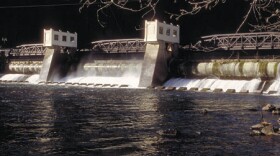EWEB is weighing what to do with a near century-old canal that’s feeling its age.
At what’s called the Cogswell Reach on the Leaburg Canal, Jeremy Somogye, strategic evaluation project manager for EWEB, points to sections of the canal first built in the late 1920s. An inspection by the Federal Energy Regulatory Commission led to changes.

“In 2018, it became known that there was excessive seepage in the area, and therefore FERC required us to decommission the canal until we came up with a solution to move forward.”

The Leaburg Canal only channels stormwater runoff, now. A coarse line of brush shows where the waters used to flow high and free, but that is now mostly yellowed and scraggly.
The four options EWEB’s board is considering are: complete decommissioning and removal of the dam, canal, and water plant (cost estimate $177M); full restoration/renewal of the same ($180M); partial return to service ($125M); and converting it for stormwater conveyance ($129M).
Mark Zinniker, EWEB’s Generation Engineering Supervisor, confirms that FERC’s inspection kicked off this project.
“Unfortunately we realized in 2018 that the extent of seepage that was taking place was really related to the original construction, and the quality of that construction. The canal was built in the late 1920s and they did use the best practices of that era. However, it had vulnerabilities.”
Those vulnerabilities include seepage issues, and the canal’s vulnerability to earthquakes. Soft deposits have been found in the canal that are not up to today’s seismic resilience standards.
Zinniker emphasizes there is no immediate danger of uncontrolled water flow.
EWEB acknowledges that whatever option is chosen by its board by year’s end, the utility would have to increase its electricity rates to finance the required capital spending. Their finance department is still calculating the potential rate increases for each alternative, and present their findings to EWEB commissioners in October.
Additionally, EWEB says the Project Team has held six listening sessions on Leaburg Lake, to hear from upriver residents on how the proposed alternatives would affect them and are planning additional information sessions for Eugene customers in September and October.
A summary of customers’ concerns gathered through these sessions and submitted through the Public Comment Form (until October 10) will be shared with Commissioners to advise them of the social impacts.
On its website, EWEB invites its customers to EWEB's Operations Center at 4200 Roosevelt Boulevard in Eugene to view a video, "Determining the Future of the Leaburg Hydroelectric Project" and engage in Q&A sessions on the following dates:
- Monday, September 12, 2022 (5:30 - 7:30pm)
- Wednesday, September 28, 2022 (5:30 - 7:30pm)
- Thursday, October 6, 2022 (4-6:00 pm)
In addition, EWEB staff will present virtual webinars for “Lunch & Learn” sessions. Click on the dates below to register:
Copyright @2022, KLCC.







